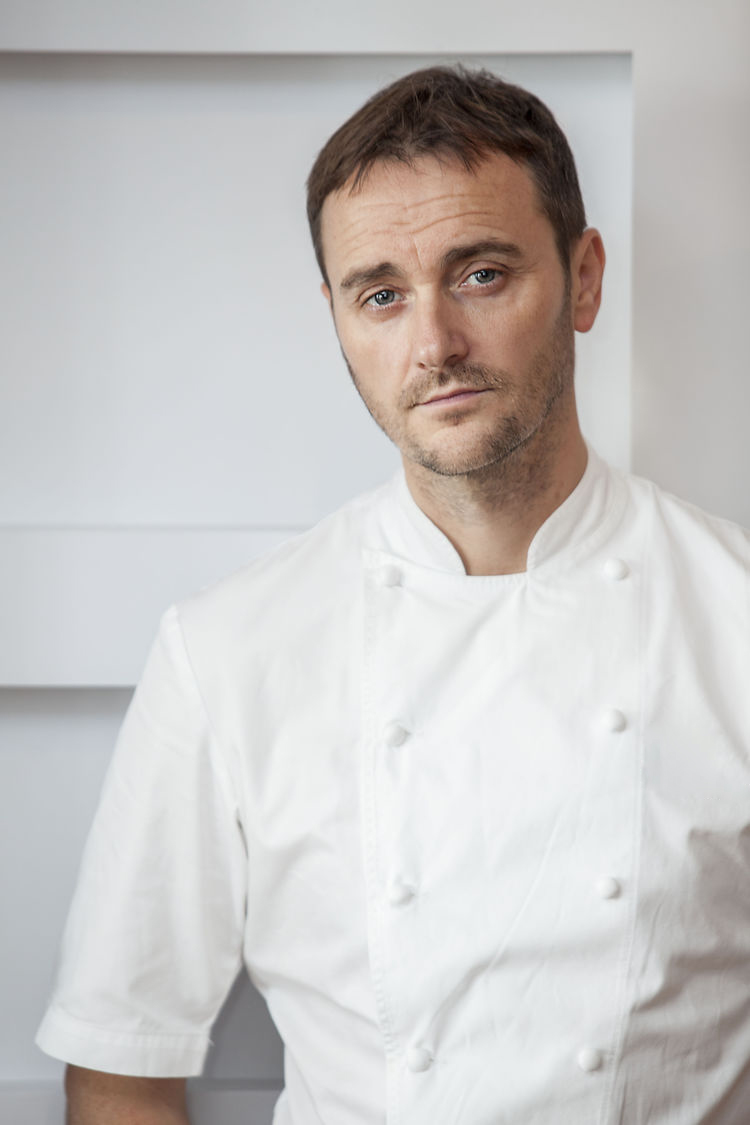
Global Issue
Global Issue: Editor’s Letter
Editor’s Letter
John Fraser
The Michelin-starred chef has a story to tell you through his cooking
Pundy’s Picks for Conscious Travel
Six tips for considered and conscious travel
Genmaicha Martini Recipe
The classic martini plus the health benefits of green tea
The Spread Love Project by Nicholas Konert
How Nicholas Konert’s rainbow heart design became an international icon
Wade Davis
Anthropology is the antidote to today’s nativism says the scholar and author
Carla Sozzani
The future of retail according to the founder of legendary concept store 10 Corso Como
The Art of Migration
The power of art to inspire empathy and social action
John Pawson
Zen Buddhism and minimalist purity drive the celebrated architect
Amy Duncan
As the CBD line Mowellens expands into skincare, its founder shares the personal story behind her company
Sila Sveta
Moscow’s favorite media studio finds the perfect balance between art and commerce
David de Rothschild
In his calls for environmental awareness, the modern explorer finds harmony between man and nature
Can Fashion Be Sustainable?
Shaping a better world through what you buy – or don’t
Brendon Babenzian
Supreme’s former creative director wants to end the cycle of consumption with his new brand Noah
Lily Kwong
Nature invades the urban jungle in the landscape designer’s expansive projects
House of Yes
Behind the scenes with the Bushwick nightlife collective promoting inclusivity and consent culture
Vivie-Ann Bakos
DJ Extraordinaire
Chez Dede
A medium in which two world-traveling, adventurous spirits absorb the globe’s vast curiosities and share them freely
Jesse Israel
A meditation guide for extraordinarily large groups
Liya Kebede
The Ethopian model, activist, and entrepreneur uses her label Lemlem as a force for change

-
 2.5ACRES OF CENTRAL PARK'S STRAWBERRY FIELDS WALKED.
2.5ACRES OF CENTRAL PARK'S STRAWBERRY FIELDS WALKED. -
 4ONE DOLLAR HOTDOGS CONSUMED (WE'RE TRYING TO HELP LOCAL BUSINESSES).
4ONE DOLLAR HOTDOGS CONSUMED (WE'RE TRYING TO HELP LOCAL BUSINESSES). -
 16MINUTE CHINATOWN MASSAGE INDULGED IN.
16MINUTE CHINATOWN MASSAGE INDULGED IN. -
 37SKYSCRAPERS SEEN.
37SKYSCRAPERS SEEN. -
 5GAMES OF BILLIARDS PLAYED AT THE NEW YORK EDITION.
5GAMES OF BILLIARDS PLAYED AT THE NEW YORK EDITION. -
 5GAMES OF BILLIARDS LOST AT THE NEW YORK EDITION.
5GAMES OF BILLIARDS LOST AT THE NEW YORK EDITION. -
 2BOROUGHS VISITED (WE'LL GET TO THE OTHER ONES SOON, PROMISE).
2BOROUGHS VISITED (WE'LL GET TO THE OTHER ONES SOON, PROMISE).

Jason Atherton
in Conversation with Frank Roberts
“I was born a chef; I’ll die a chef,” Jason Atherton calmly explains one bustling afternoon in the decadent dining room at the New York EDITION. Before even tasting the Michelin-starred chef’s menu, his Manhattan debut “The Clocktower” is delicious with a lavish, timeless interior indicating it will be an institution, not just a passing fancy in the city’s long culinary legacy. Atherton rose to prominence training at el Bulli, then cut his teeth as Gordon Ramsey’s right-hand man before launching his incredibly successful restaurant group, now counting 22 venues to his oeuvre. To complement Atherton’s knack for guest experience, Frank Roberts will be heading up EDITION’s cultural and entertainment programming. Here, Atherton talks to Roberts about what makes him tick.
HOW HE APPROACHES A NEW PROJECT:
It doesn’t matter if it’s New York, Tokyo, Hong Kong, London, it’s really important that you look at it with a fresh pair of eyes. We never go into any city with expectations. We just go in really humble. I always say to my guys we want to make a really good neighborhood restaurant first; what comes after that is what comes after that. We never open a restaurant to win accolades or show to , we just want to open a really great restaurant that people enjoy.
JASON ATHERTON VS. JASON ATHERTON’S RESTAURANTS:
I never call a restaurant after my name because it just be- comes too pretentious. If we open a restaurant it’s for New York City. It’s not for me. It’s important to me that 95% of my sta here are from New York. It’s a New York restaurant.
ON “TYPICAL” NEW YORK FLAVORS:
New York has a very strong identity with its past, its heritage. People are from all corners of the world. So you can come to New York and have great Chinese, Japanese, Ethiopian, Italian food—you name it. That almost dictates what New York cuisine is. That [multi-culturalism] is the New York flavor we take inspiration from.
FUGGEDABOUTIT:
Italian food is a great strength in this city. We went to Roberta’s pizza the other night. What an inspiration that place is. That’s New York. You walk in, everyone’s too cool for school. I think I’m pretty cool, but I wasn’t cool enough to be in there.
HIS HOSPITALITY ETHOS:
If you’re going to be successful in this industry, hospitality has got to be in your veins. It’s got to be the blood that ows in your whole body. It’s got to be what pumps your heart when you wake up in the morning to what makes you sleep when you go to bed. People come to us for a certain amount of time in our day—it’s not our job just to make people happy, it’s our job to make them feel special.
NAVIGATING CULTURAL DIFFERENCES:
In Asia the big thing is to bring your own wine to restau- rants. It’s almost their way of showing they like good wine at home. It’s disrespectful to stop people from doing it. So it’s important to understand those cultural di erences.
ON WHAT MAKES A GREAT RESTAURANT:
At the end of the day, if you want to do a good job, you cook your heart out, you give great service, and if it’s good value for your money, people will come to your restaurant, end of story.
ON FASHION:
It’s a very important part of who you are as a person. I love the saying, “You can tell a man by looking at his shoes.” I think that’s a true analogy. [Looks down] They’re kitchen shoes—not many people cook in George Cleverley.
ON DISCIPLINE:
I joined the army catering corp. when I left school at 16. I was like the worst soldier on planet earth. I was a bit of an unruly teenager and spent a few nights in military prison. Cooking’s a very disciplined art form. Everything I hated about being disciplined, I now love. It just goes to show when you actually love something you’re happy to accept the discipline that goes with it.
HOW HIS NEW YORK DEBUT CAME ABOUT:
It was a month after we opened Berners Tavern [at the London EDITION] and it was packed. Every celebrity from the UK was in. Everybody was everybody’s best friend. It was the hottest place—you burnt your feet when you walked in. And Ian said (I won’t even try to do his accent), “Do you want to come to New York?” I didn’t even have to think about it. We shook on it, that was my contract.
CHECK YOUR EGO AT THE DOOR:
Everyone’s replaceable. Yes, there are people with special talents but it doesn’t give you the right to be obnoxious. The only thing that matters is that the restaurant opens on time, people love it, they want to come back; the minute they sit at this table, get the first cocktail, first walk through the lobby, have their first guest experience at the Gold Bar, their first mouthful of food, and they go, “oh my god, where has this place been hiding? I want to come back.” The minute you start believing you’re bigger than that it all goes wrong.
SECRET TO HIS SUCCESS:
When you’ve done your job a long time, people say it comes second nature. No— nothing ever comes second nature. I’ve been cooking for 28 years now. It’s a 28-year overnight success story. It doesn’t come to anybody like (snaps his fingers) that. Never. Unless you smuggle drugs.
Art & Culture
The power of art to inspire empathy and social action
Zen Buddhism and minimalist purity drive the celebrated architect
Moscow’s favorite media studio finds the perfect balance between art and commerce
Behind the scenes with the Bushwick nightlife collective promoting inclusivity and consent culture
DJ Extraordinaire
A medium in which two world-traveling, adventurous spirits absorb the globe’s vast curiosities and share them freely
A meditation guide for extraordinarily large groups
Experiences
Moscow’s favorite media studio finds the perfect balance between art and commerce
In his calls for environmental awareness, the modern explorer finds harmony between man and nature
Behind the scenes with the Bushwick nightlife collective promoting inclusivity and consent culture
DJ Extraordinaire
Food & Drink
The Michelin-starred chef has a story to tell you through his cooking
Six tips for considered and conscious travel
Personalities
Style
The classic martini plus the health benefits of green tea
How Nicholas Konert’s rainbow heart design became an international icon
As the CBD line Mowellens expands into skincare, its founder shares the personal story behind her company
Nature invades the urban jungle in the landscape designer’s expansive projects
The Ethopian model, activist, and entrepreneur uses her label Lemlem as a force for change

